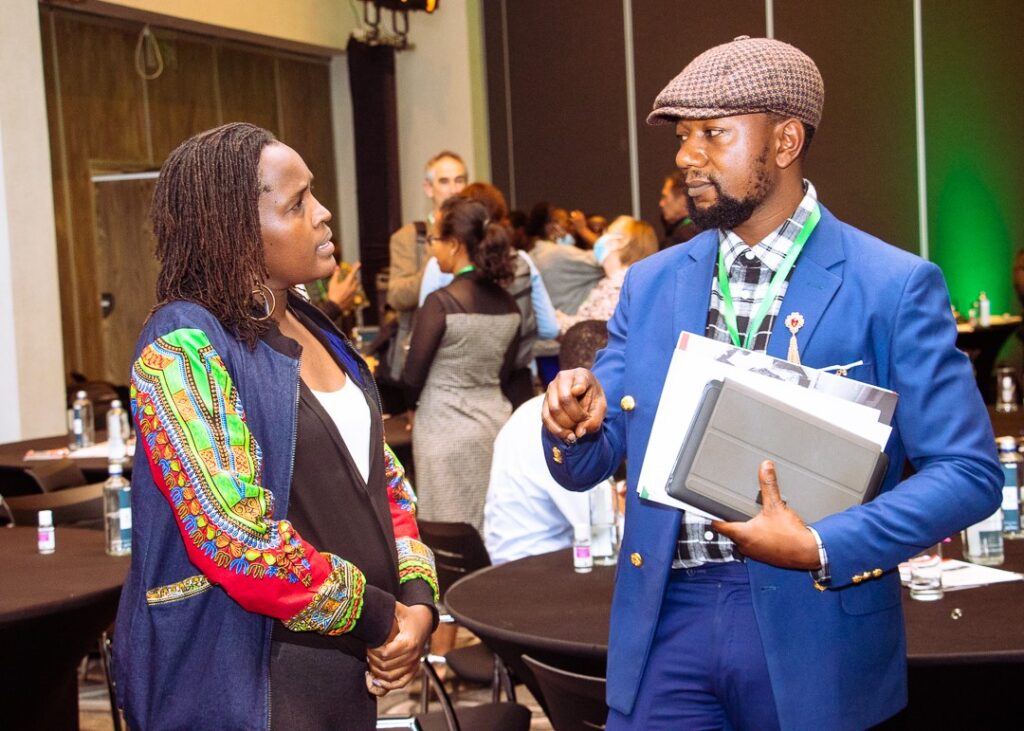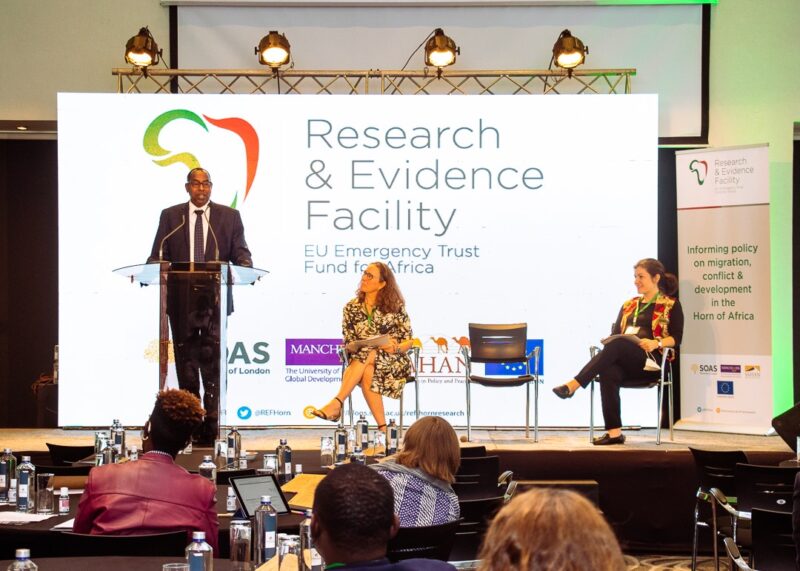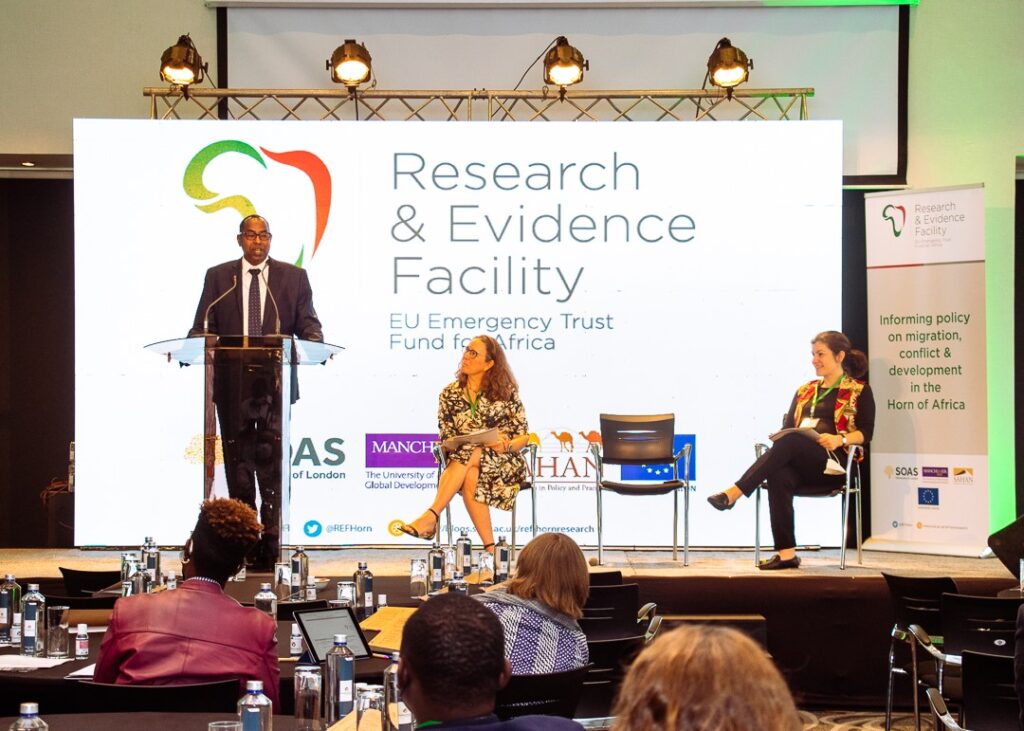
On 9th and 10th June 2022, the Research and Evidence Facility (REF) of the EU Trust Fund for Africa in the Horn of Africa convened its second international conference around the theme ‘Migrants and Forcibly Displaced Persons: Towards Greater Inclusion and Protection’. More than 100 people participated in person at the Trademark Hotel in Nairobi in our first large-scale event since the Covid-19 pandemic, with additional participants joining online via Zoom.
Since its previous international conference in January 2019, the REF has continued to collate and produce evidence-based knowledge on a range of themes, including displacement, return and (re)integration; environmental change and mobilities; Technical and Vocational Education and Training (TVET); Information and Communication Technologies (ICTs); refugee employment and the role of the private sector; and the Comprehensive Refugee Response Framework, among others. REF studies have produced results that have been used for programming and have also introduced new information that other organisations have used in conducting their own research.
The purpose of this conference was to showcase recent and ongoing research being carried out by the REF as well as other partners, using such evidence to foster discussion and action to promote an improved policy environment on migration, forced displacement and development. The conference brought together a range of stakeholders, including from governments, universities, media, research institutions, the UN, NGOs, civil society and private sector. An exhibition showcased the work of three artists from the region, as well as a photography project by Peter Caton and René Habermacher with accompanying narratives by Susan Martinez and Devyani Nighoskar, recently commissioned by the REF with Samuel Hall to accompany a study on displacement, return and reintegration in South Sudan.
We were delighted to welcome a number of plenary speakers, including Myra Bernardi of the EU Delegation to Kenya and Ambassador Mohamed Abdi Affey, UNHCR Special Envoy for the Horn of Africa who opened the event, and Lea Pascal of the European Commission – DG INTPA and novelist Nuruddin Farah who spoke on the final day. Alongside this, the conference consisted of a number of panels, held in parallel or plenary style, which included presentations as well as time for rich discussion and Q&A.
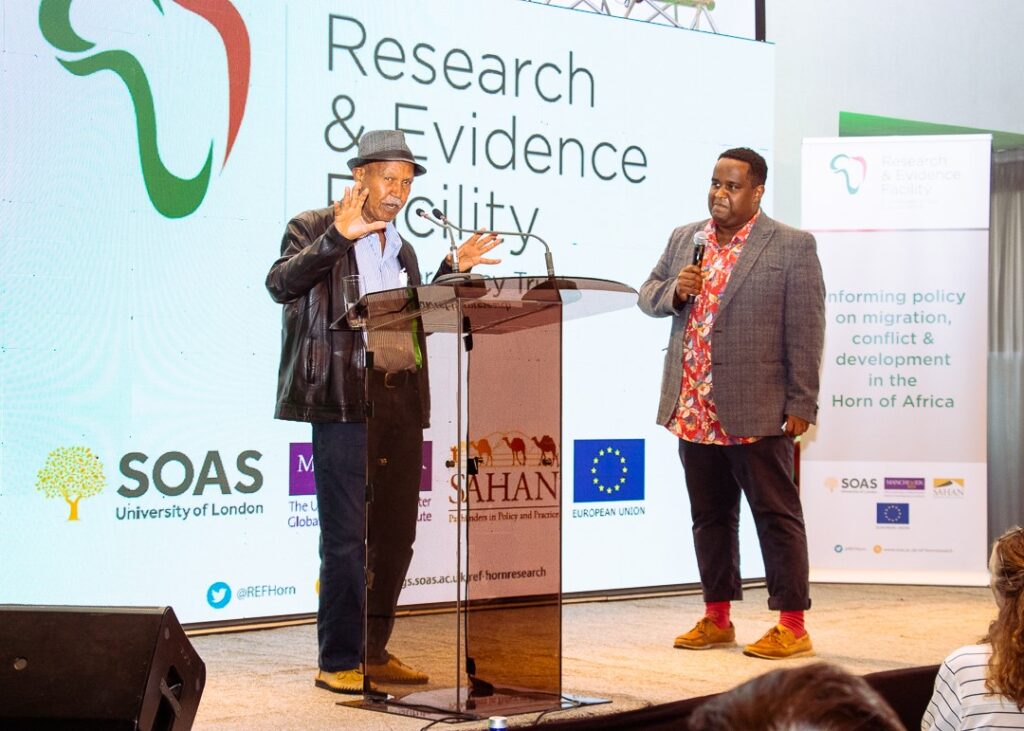
As the REF will complete its programme of research in 2022, this conference provided a chance to review the state of the research in the region, and to consider the future of migration, displacement and development research, policy and practice. In this briefing note, some of these key discussions from the conference are summarised.
Summary of sessions
In the opening session, Dereje Feyissa Dori (Addis Ababa University) explored migrants’ protection practices through a case study of the Ethiopia-South Africa Corridor. This was accompanied by a summary of recent project work on human mobility and climate change in the IGAD region from Noora Makela (IGAD). These two different presentations set the tone for the conference to follow, which included discussions on both programmes and policy, as well as migrants’ own experiences, and which covered a range of thematic areas.
The second plenary session turned attention to sustainable refugee livelihoods and the role of the private sector. For many refugees, livelihood security depends on being able to work and move. Private sector partners can play an important role in creating opportunities for refugees and facilitating access to employment and markets. This panel presented the findings of a study conducted jointly by REF and Botho Emerging Markets Group. We heard from the study authors, UNHCR, refugee artists and scholars working on these issues, and premiered an animation on the theme.
In the final plenary session, we further explored inclusive responses to forced migration, with a focus on localised knowledge ecosystems. Chaired by Linda Oucho (African Migration and Development Policy Centre), this panel discussed how meaningful inclusion of refugees and other migrants in forced migration research can lead to more effective and legitimate policy and practice. Papers exploring these themes were authored by Heather Alexander (Local Engagement Refugee Research Network, Canada), Dulo Nyaoro (Moi University), Kiya Gezahegne (Addis Ababa University), Toussaint Farini (Salama Africa), Laura Buffoni and Katie Drew (UNHCR).
Plenary panels were interspersed with a number of parallel sessions, allowing participants to tailor their participation to a range of cross-cutting themes. These are summarised below.
Mobilities and livelihoods in a changing environment
Taking forward the discussion on climate change that started in the opening plenary session, in this session chaired by Hussein Mahmoud (Technical University of Mombasa), speakers considered how environmental and climate change is influencing patterns of mobility and livelihoods in the Horn of Africa. The panel explored individual, community, regional and national scales of responses and highlighted innovations and adaptations of people in the face of uncertainties. Tarnjeet Kaur Kang did this through a meta-analysis of South Sudan, particularly focusing on the intersectional and multi-sectoral approach required to better understand how vulnerable populations are impacted by cyclical shocks. Chloe Sydney (Internal Displacement Monitoring Centre) presented a paper co-authored with Christelle Cazabat and Alesia O’Connor reflecting on IDMC’s recent research on internal displacement in the context of slow-onset disasters and climate change in Kenya and Somalia. Bereket Tsegay’s (Pastoral and Environmental Network in the Horn of Africa) presentation examined land, climate change and internal migration experiences of young people from Wolayta in Southwestern Ethiopia, drawing from a recent REF study. Caitlin Sturridge (ODI) shifted the framing of people’s movements in the context of environmental change away from a focus on ‘crisis’ to one attentive to ‘mobile livelihoods’, also drawing on a recent REF study.
Protection during displacement: Considering gender and the life course
This panel, chaired by Elisabeth Magnes (EU Delegation to Kenya), dealt with protection, migration and displacement. Discussions specifically focused on women, children and people with disabilities. Panellists Louisa Yasukawa (IDMC), Christelle Cazabat (IDMC), Henrietta Nyamnjoh (University of Cape Town), Casey Pearson (Start Network) and Abril Rios Rivera (University of Oxford) used case studies from several countries, including Ethiopia, Somalia, South Africa and Kenya, to highlight variegated impacts of internal displacement (livelihoods, health, education, security and housing), the impact of self-reliance models on child protection in integrated settlements, agency and accelerated adulthood and gender empowerment and inequality. There was a common call for inclusive and integrative policies, as well as the importance of gathering disaggregated data to highlight the scale and scope as well as to improve understanding of these issues.
Displacement, return and reintegration: Opportunities and challenges
This panel, chaired by Rufus Karanja (Embassy of the Netherlands), explored the experiences of migrants, refugees and returnees in different contexts of the Horn of Africa. Speakers reflected on the displacement and return trajectories of people, the specific challenges and barriers they face, the impact of return and reintegration on returnees, hosts and governments (local and national), barriers to return and reintegration, and how policies and practice influence return and reintegration. Davide Bruscoli presented a paper co-authored with Merve Kan and Renato Libanora (IOM) on migration, return and reintegration experiences as determinants of the incidence of common mental disorders among returning migrants in Ethiopia. Nassim Majidi (Samuel Hall) and Joseph Malish (Windle Trust International) presented research commissioned by the REF on displacement, return and reintegration in South Sudan, based on fieldwork in South Sudan, Uganda, Kenya and Ethiopia. Abdullahi Abdille Shahow (Sayara International) presented findings from recent research on host community perspectives on refugee return in Dadaab refugee camps in northern Kenya. Abdullahi Watiin presented a paper co-authored with Ben Mbaura, Laura Bennison and Hafsa Hussein (IOM) examining relocation through a case study of Barwaaqo in Somalia.
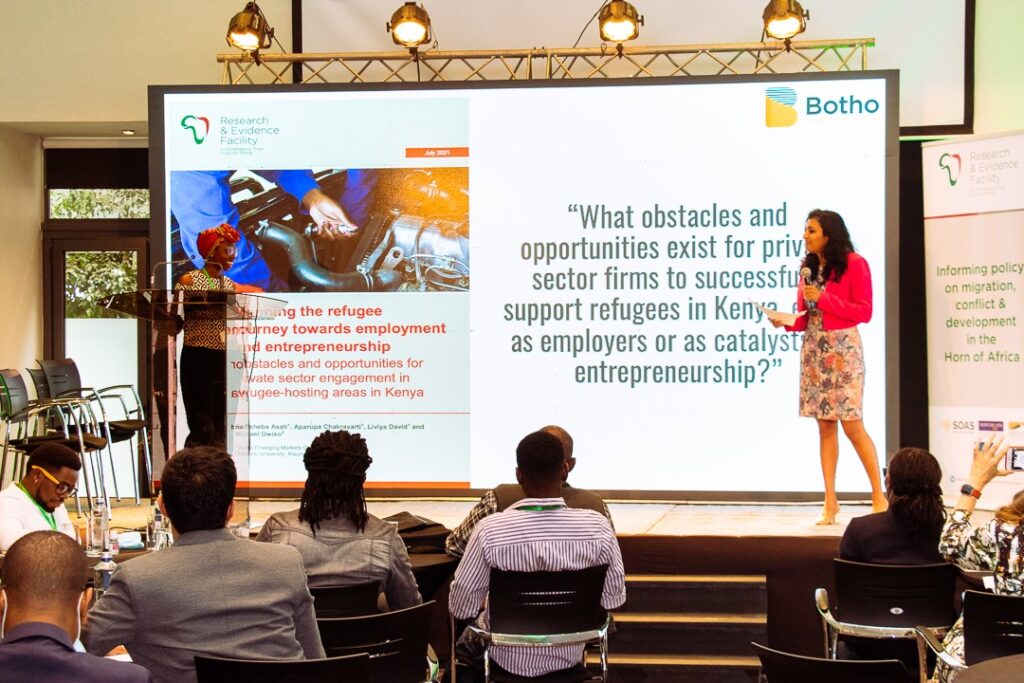
Implementing the Comprehensive Refugee Response Framework
This panel covered issues regarding the implementation of the Comprehensive Refugee Response Framework (CRRF). The panel began with a background into the development of the CRRF by panel chair Vincent Chordi (REF), a theme explored in recent REF research, which was built on by the first speaker Abdirahman Ahmed (Jigjiga University). Following this, speakers discussed the dynamic relationships between refugees and host communities, focussing on the economic, social and community impacts, and the role of remittances for families left behind by refugees. The panel closed with a look into how successful implementation of CRRF in certain places, can inform wider responses to displacement in Ethiopia and the Horn of Africa, whilst acknowledging the current challenges to durable solutions. Speakers included Tirsit Sahledengil (Addis Ababa University), Girmachew Adugna (Embassy of the Netherlands Ethiopia) and Mehreteab Ghebregergs (Regional Durable Solutions Secretariat).
Meaningful participation: The role of refugee-led organisations
The Global Compact on Refugees (GCR) recognises refugees and host community members as key to ensuring that policy and programming responses are meaningful, appropriate, accessible, and inclusive. This panel critically examined refugee participation in programming, the role of refugee-led organisations, and the barriers and opportunities for meaningful participation of refugees in decision-making processes. Chaired by Achieng Akena (International Refugee Rights Initiative), speakers included Andhira Yousif Kara, Mary Gitahi, Uwezo Romazani, Abis Getachew, Mark Okello Oyat, Ochan Robert Leomoi, Arte Dagane (LERRN, Refugee Studies Centre, Dadaab Response Association) presenting on comparative research on the impact of refugee-led organisations in Ethiopia, Kenya, Tanzania and Uganda. They were joined by Daniel Mekonnen exploring questions of ‘inclusion’ in refugee governance, Nyaruiru Ndungi (Norwegian Refugee Council) on addressing barriers to refugee group registration, and Itah Patience Mbeki (Makerere Institute of Social Research) examining the role of education, particularly TVET, in the integration of refugees.
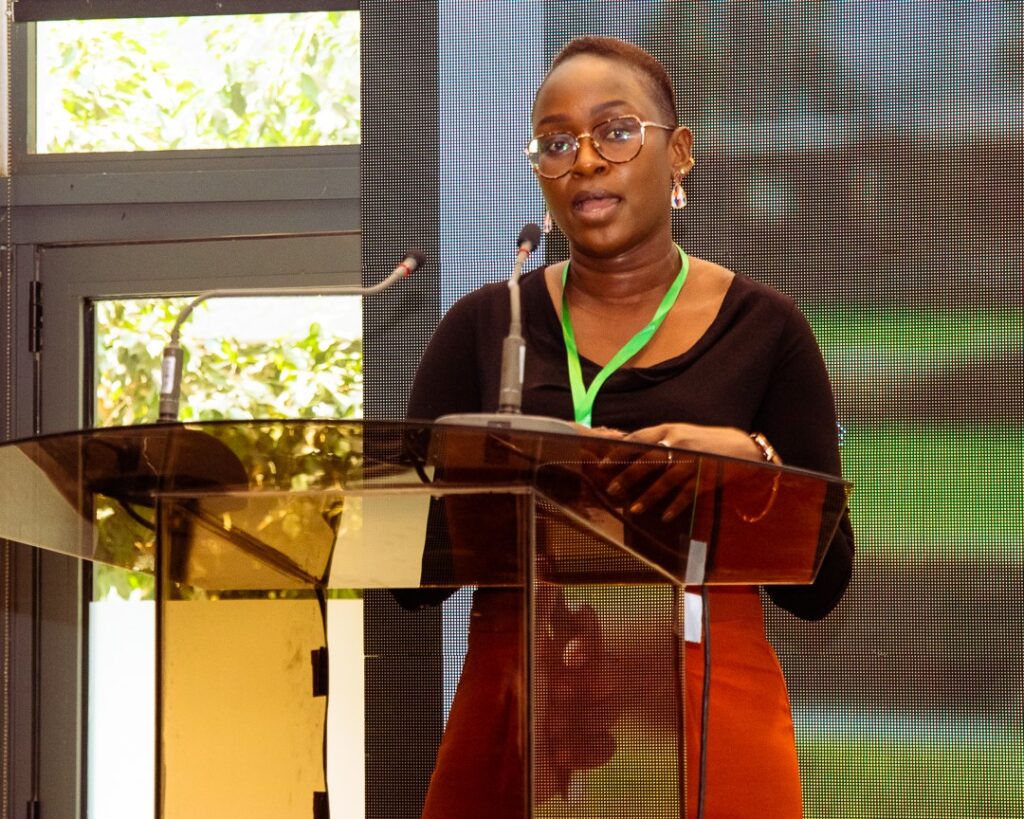
Borderlands: Opportunities and constraints for cross-border livelihoods and programming
This panel explored the opportunities and limitations for cross-border livelihoods and programming. Discussions looked at best practice for programme implementation arguing the need for better coordination and knowledge sharing. It also explored indigenous institutions and how these can contribute to, and help build, resilience in cross-border communities as well as reflecting on the challenges of cross-border mobility and trade. Panellists included, Flora Vever, Hugo Le Blay (Altai Consulting), Yasmin Anis (Danish Refugee Council), Ayan Mahamoud (Independent Consultant), Longoli Simon Peter (Karamoja Development Forum) and Padmini Iyer (REF), and the session was moderated by Oliver Bakewell (REF).
Making connections and finding a place
This panel considered the various ways that people on the move make connections with others on their journeys, where they settle, and with wider networks at home and abroad. Today many of these are virtual links sustained through information and communication technologies that have an increasing impact on migration and its outcomes. Migrants use ICT in innovative ways to adapt to new communities, new workplaces and new cultures, while maintaining links to their families and communities back home. However, this is no substitute for the day to day work of navigating social and political relationships that enable migrants to establish a place for themselves. These dynamics were explored in presentations by Peter Chonka (King’s College London) on forced mobility and mobile connections at the margins of Somali cities. Peter was also joined by Yidnekachew Haile (Royal Holloway University of London) who presented their co-authored paper on ICTs and mobility in the Horn of Africa, based on a recent study commissioned by the REF. Herve Nicolle and Jared Owuor (Samuel Hall) shared lessons learned from digital skills initiatives in Dadaab and Kaloyeyei, Kenya. Tanja Müller (University of Manchester) and Oliver Bakewell (REF) presented findings (co-authored with Mohamed Bakhit) from research among Ethiopians, Eritreans and South Sudanese living in Nairobi, Khartoum and Addis Ababa, analysing their various forms of political belonging.
Examining pandemic impacts on migration and migration research
This session explored the impact of the Covid-19 pandemic on migration and carrying out research into migration. Discussions covered: the impact of the Covid-19 pandemic on migration and movement in Kenya; the challenges and ethics of “doing” research in a time of Covid-19; refugee led research into the impacts of Covid-19 in the Kakuma refugee camp in Kenya; and the pandemic, returnees and IOM in the Horn of Africa. Panellists included John Maara (University of Nairobi), Dostin Lakika (African Centre for Migration and Society, University of the Witwatersrand), Mark Okello Oyat (Dadaab Response Association), Pascal Zigashane (Action pour le Progrès) and Michael Loevinsohn (Itad/Applied Ecology Research). The session was moderated by Konstantin Gruev of the European Commission DG-INTPA.
